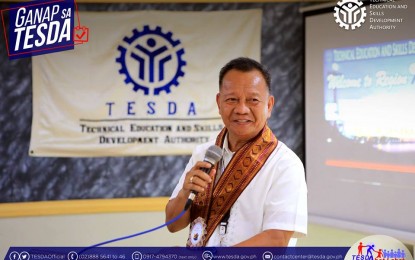
TESDA Director General Secretary Isidro Lapeña (Photo courtesy of TESDA)
MANILA – Technical Education and Skills Development Authority (TESDA) Director General, Secretary Isidro Lapeña on Thursday said the agency has been addressing job-skills mismatch in the country.
This, after Senator Sherwin Gatchalian called on TESDA to address the persistent high rates of jobs-skills mismatch among technical vocational education and training (TVET) graduates.
"The TESDA management acknowledges the occurrence of jobs-skills mismatch among TVET graduates, even if the mismatch is not unique to this set of graduates, more so to the Philippines," Lapeña said when asked for comment by the Philippine News Agency.
Gatchalian said TESDA’s budget grew by about 19.71 percent on average over the past six years. For 2022, the agency proposed PHP14.7 billion budget that is PHP94.8 million or 0.65 percent higher compared to the 2021 budget.
“This is quite concerning considering that the budget of TESDA has skyrocketed over the last 10 years. At this time, TESDA is receiving PHP14 billion more or less, on average, pero may mga report pa rin tayong nakukuha na 70 to 80 percent ng mga graduates ng TESDA ay nakakuha ng trabaho na hindi angkop sa kanilang naging pagsasanay o training (but we still get reports that 70 to 80 percent of TESDA graduates have gotten jobs that are not suitable for their training),” Gatchalian said in a news release on Wednesday.
Lapeña said a global study conducted by the McKenzie Group found that the jobs-skills mismatch is “universal and affects developed, developing and third world countries” alike.
He said according to the United Nations Educational, Scientific and Cultural Organizations-International Center for Technical and Vocational Education and Training (UNESCO-UNEVOC), there is “horizontal” jobs-skills mismatch when the type of skills is not fit for the current job, “vertical” when the level of skills is higher or lower than the level of skills required for a certain job, and “geographical” when the workers with skills are based in a place different from those where their skills are needed.
"It cannot be denied that there is much to be done to lower the job mismatch rate in the coming years. That’s why TESDA has been continuously addressing these mismatch types," Lapeña said.
He said TESDA has issued Circular 042 s. 2021 “Implementing Guidelines on the Area-Based and Demand-Driven TVET” that supports the implementation of an “area-based and demand-driven” policy direction at all levels of operation.
The policy direction consolidates the major TESDA processes leading to the development and delivery of TVET programs to respond to the identified priority and emerging skills at the national, regional, and provincial levels.
"Ever since, in developing training regulations and standards, TESDA has involved industry partners and employers to ensure that what is being taught to the tech-voc trainees are the skills needed by the industry," Lapeña said.
He said another circular was issued this year to establish national and local industry boards to make the country's TVET system more responsive to the demands of the industry.
TESDA, he said, also launched the “EBT to the Max” advocacy to push for more proactive promotion of its Enterprise-Based Training (EBT) program among industry partners to better prepare workers and learners in their respective regions.
"This advocacy programs include intensified promotion and marketing of EBT programs; development of EBT locator system; and development of incentive packages for EBT implementation. It also involves the development and implementation of EBT training models that are suited to Philippine settings, as well as nurturing the existing and developing new arrangements with industry and other relevant sectors for maximized implementation of EBT programs," he said.
He added that TESDA has also been establishing partnerships with private companies and government agencies to give Filipinos better access to quality training and widen its reach to include more sectors of society. (PNA)
